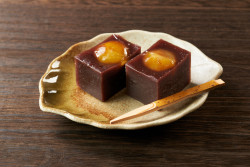
April 9, 2009
Marijuana Underground
Celebrity busts and student smokers have Japan's authorities in a tizz. But what do users make of Japan's ganja explosion? Shaun Davies delves into Tokyo's marijuana subculture to find the answer
By Metropolis

Smoking guns from the Taimado catalogue
Japan has some of the world’s strictest drug laws, with heavy sentences meted out for relatively minor offences. About five years ago, Maeda became embroiled in a high-profile case involving his friend, the late writer Ramo Nakajima.
Nakajima, who had gained a cult following with novels such as Tonight, Every Bar in Town, asked Maeda to supply him with some marijuana, ostensibly to help with his glaucoma. Maeda enlisted a grower friend, who gave a 1/4 ounce to the writer. Police caught Nakajima with the pot at his home, and Maeda and the grower were also arrested. Nakajima later died after falling down a flight of stairs in an alcohol-induced stupor.
“I received an eight-month suspended sentence and three years’ probation. I fought that all the way up to the Supreme Court, because it was for medical problems,” Maeda says.
Maeda battled the conviction on constitutional grounds, but lost. He now has a criminal record, and his grower friend remains in prison five years later.
“Five years is too much. My friend is 56 years old now. I am really angry—he tried to help people. Even if glaucoma was not the main reason, I know that Nakajima needed marijuana for his depression,” he says.
Peter, a 36-year-old English teacher who hails from America’s west coast, also has first-hand experience with Japan’s marijuana law enforcement. Tokyo police caught him smoking last year, and he spent the next ten days sharing a cell with a homeless man, a heroin addict and an “ore ore” scammer.
“We were out on the town in a pretty popular area in west Tokyo and me and some people I knew started smoking,” Peter says. “A couple of witnesses saw us and called the cops … it was just so surreal for me. I just thought, ‘Is this really happening?’”
Whisked away in a police car with sirens blaring, he soon found himself handcuffed and tied to a chair, where he went through several hours of interrogations about who owned the drugs and the one member of his group who’d escaped.
“I was in over my head, thinking this is more serious than I thought it was and this is not going to be an easy ride. When it really hit me was when they started doing the fingerprinting, because that was a precursor to going into a police holding cell,” he said.
For the next ten days, Peter lived a highly regimented prison life. English was not allowed—he passed the time by revising Japanese textbooks which his girlfriend brought in. Peter speaks good Japanese, so he was able to chat with his cellmates, which helped alleviate the boredom. So did meals, letter writing and cigarettes.
“I didn’t really smoke cigarettes before that. You just look for the little things, anything you can do to get through the day. There were two breaks: one was sleeping at night, because your mind can take you anywhere you want, and the other was smoking a cigarette.”
Peter is circumspect about his experience. On the one hand, he can’t understand why smoking marijuana is regarded as such a heinous crime, but on the other he knowingly broke Japanese laws—in a public place.
“When you know that something’s illegal and you still do it, then you run the risk of getting caught. As much as my personal view is that marijuana’s not such a big deal, that rule is still there, and I think it’s important to respect that,” he says.
“But I kind of felt it was a bit harsh. For doing something which causes no victims and is pretty much innocent, I think it’s pretty ridiculous, to be honest.”
It’s far-fetched to imagine that drug laws in Japan will change any time soon. Media, political and public opinion is stacked against those who would like to see pot decriminalized. Occasional pro-marijuana demonstrations, like the recent 420 March in Tokyo, draw hundreds of people, but in reality support for legal reform is very low.
“Of course, the smokers want decriminalization of marijuana, and other people want hemp for industrial purposes, and others for medical purposes,” Maeda says. “But it’s not yet very strong.”
“Through the events of this last half year, the TV and the police and the government have tried to implant the idea that marijuana is very bad,” he continues. “Smokers become violent and lose their memory and become sick. But I don’t think this will affect a lot in the future, because in the last 15 years, people came to know the reality. Even if the government spreads false stories, people will come to know.”
Takeshi and Kenji, of course, support the decriminalization of marijuana. But they don’t seem keen to take the fight to the authorities—what they’d really like is for the public attention to disappear so they carry on smoking, without fear of intense police and government scrutiny.
“It’s about 50-50 in terms of whether people believe what the government says,” Takeshi says. “We don’t care what these people think. Their mindset is really old-school. It’s a really tight feeling.”
As the night rolls on in Saitama, so do the joints. Ideas are discussed, jokes are told and YouTube classics are shared. Eventually, the party degenerates into a jam session of staggering musical ineptness.
It seems bizarre that one curious neighbor could land us in jail, possibly for years. We’re criminals, every one of us—relaxed, giggling, happy criminals.
November 2007
Two rugby players from Kanto Gakuin University are arrested for growing pot in their apartments. It later emerges that ten of their teammates also smoked marijuana
February 2008
Japan-based Canadian actor Jai West is busted receiving pot through the mail
May 2008
Japanese cops lose 124 grams of hashish in a random passenger’s luggage during a training exercise
August 2008
Russian sumo wrestler Wakanoho is arrested for alleged marijuana use and possession
September 2008
Urine tests lead to the arrests of two more Russian wrestlers, brothers Roho and Hakurozan. Five students from Hosei University and one from Doshisha University are also arrested
October 2008
Two students at Tokyo’s Keio University are busted for possession
November 2008
Waseda University reveals that two students have been caught smuggling marijuana from the Netherlands. Another Waseda student is caught growing pot in his room
December 2008
A Kansai University student is sentenced to three years and two months in jail for dealing marijuana
February 2009
Japanese sumo wrestler Wakakirin is arrested over five grams of marijuana. Hong Kong teen idols Kelvin Kwan and Jill Vidal are busted in Shibuya over a cigarette containing 0.2 grams of marijuana. A Kyoto University law student is arrested after walking into a police station in Osaka carrying marijuana
Taimado: Store and online shop sell pipes, bongs, rolling papers, clothing,
incense and CDs. 2F, 2-6-5 Kitazawa, Setagaya-ku. Tel: 03-5454-5880. Open daily noon-11pm. Nearest stn: Shimokitazawa. www.taimado.com
Hemp Restaurant Asa: Serves a full menu of healthy hemp-based dishes. 3F, 2-18-5 Kitazawa, Setagaya-ku. Tel: 03-3412-4118. Open Mon-Tue and Thu-Fri 5-11:30pm, Sat-Sun & hols noon-11:30pm, closed Wed. Menu in Japanese and English. Nearest stn: Shimokitazawa, south exit. www.asanomi.jp
Chanvre Hemp Beauty: Offers a variety of oils, aromas and unguents. 5F, Yokoyama Building, 2-11-8 Kichijoji Honcho, Musashino-Shi. Tel: 0422-20-5306. Open Fri-Wed 11am-8pm, closed Thu. Nearest stn: Kichijoji. www.chanvre.jp
Grass: Kusa, gurasu, uiido, haabu (くさ、グラス、ウィード、ハーブ)
High: Toba sareta (飛ばされた; lit: flying away)
Whacked: Buri-buri (ぶりぶり)
Joint: Jointo (ジョイント)
Bong: Bongu (ボング)
Wanna roll it?: Maku? (巻く)
Roach: Ro-chi (ローチ)







